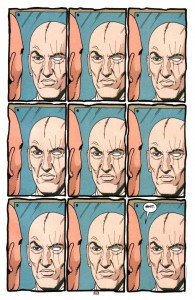At first glance, Garth Ennis’ writing on Preacher appears to be edgy and heterodox, at least for a Direct Market comic from DC. And not just in the superficial stuff that makes for a ‘Mature Readers’ label –swearing, ultraviolence, loyal canine sidekicks. No, it appears to be edgy – at least for its cultural context and intended readership – at a deeper level of content and theme. The Catholic Church is portrayed as venal and corrupt. There’s a savagely funny send-up of the idea of a messianic bloodline, as made famous in The Holy Blood and the Holy Grail (and even more famous in The Da Vinci Code).
Oh, and God is a narcissistic, selfish prick.
So, yeah, Preacher seems to be pretty ‘far out’. But a closer look reveals that Ennis’ morals are, in fact, deeply conventional. At its heart, the book is a sort of love story, and an effectively sweet one at that. And Ennis endorses in Preacher the same old-fashioned kind of masculinity that he valorises throughout most of his work, represented here with only a moderate dose of irony by John Wayne. A man, Ennis as much as out and tells us, should be strong, self-sufficient and upstanding. He should treat his lady right, do good by his friends, keep his word, and look after them critters what can’t look after themselves.
Excuse me while I ride off into the sunset.
There’s nothing wrong per se with this kind of conventionality, I think. Stated thus baldly, the book’s morality is prima facie unobjectionable.* And the book itself is easily my own favourite among the long-running series published by Vertigo.
(Suck it, Sandman and The Invisibles! And seriously don’t even bother, Y and Fables)
What is worrying, however, about Preacher — and it’s another theme that runs throughout Ennis’ work — is its conventional, even reactionary, sexual morality. Time and again, Ennis reveals that he is fundamentally uncomfortable about any sexual activity outside a very limited range. Time and again, he attributes to his villains sexual proclivities outside this range. Time and again, he uses sexual perversion as a shorthand for moral perversion.
Consider: the book’s secondary villain Herr Starr, who wants to give Margaret Thatcher a golden shower, and can eventually only reach sexual satisfaction through liberal application of a strap-on.
Or: Jesus DeSade, whose unbridled hedonism leads to pedophilia.
Or: T.C., whose unconstrained libido matches his moral and intellectual savagery.
Or: Miss Oatlash, the dominatrix and Nazi apologist. ZOMG! The uptight professional woman is secretly into BDSM – smile, you’ve just been Shyamalanned!
Or: Odin Quincannon, the evil businessman who…well, no, I won’t spoil that gag for those who haven’t read the book.
Or:
[CASSIDY SPOILER!!}
That the depths of Cassidy’s decline are marked when he’s coerced into giving his drug dealer a blowjob.
[END CASSIDY SPOILER!]
By contrast, there are only three occasions when the main good guys – viz. protagonist Jesse Custer and girlfriend Tulip ’Hare – engage in anything remotely kinky. First (chronologically at least — it occurs in a flashback), Jesse idly considers asking Tulip and her best friend Amy to join him in a threesome. He decides against it, not wanting to jeopardise his relationship with either of them—incidentally, this could well be the smartest thing Jesse does in the whole series.
Second, Tulip handcuffs Jesse to a bed, leading the poor sap to think that they’re going to get their kink on. But no such luck; it’s just revenge for one of Jesse’s misdeeds. Tulip just leaves him there while she goes out drinking with Amy.
Finally there is some suggestion, later in the series, that Jesse and Tulip do eventually use the handcuffs in the manner intended, viz. very mildly kinky sexual practices. So even when the good guys do get down and dirty, it’s about as vanilla as you could imagine.
Now, to be fair, Ennis rarely presents any of the villains’ sexual deviancies as evil in themselves (with the obvious exception of DeSade’s pedophilia). Their perversions are funny, not wicked. We’re supposed to laugh, not boo. And Ennis is under no obligation to proselytize for sexual adventurism.
But Preacher does deliberately set out to undermine some central parts of Christian morality — in particular the value of faith, and the doctrine that God deserves our worship. So it’s a bit of a let-down to find that Ennis’ views on sexuality are barely more liberal than that famous neologism, Rick ‘man-on-dog’ Santorum. And it’s even worse that Ennis perpetuates the myth that only bad guys like to get kinky.
Preacher may be a good comic but, when it comes to sexuality, it brings to mind what Homer Simpson once said about the bible: talk about a preachy book!
* but maybe not, uh, seconda facie. A while back, someone called ‘moose n squirrel’ accused Ennis of fascism, in a comment thread at Tim O’Neill’s whenwillthehurtingstop.blogspot.com. (Because I, evidently, suck and am stupid, I can’t find the post or comment now) Among the evidence was the fact that Ennis almost always presents weakness as contemptible, meriting either scorn or ridicule or both, while the good guys are almost always adept at chewing bubblegum and kicking ass. But it’s for good, of course, not for evil, so that’s A-OK. I find this a persuasive reading of Ennis, in Preacher as much as anywhere else. Those who favour a more charitable interpretation carry a heavy burden of proof, or so it seems to me at any rate.
Not that fascism would necessarily invalidate Ennis’ work, even if it is there. I like all kinds of comics with dubious ideological contents: e.g. Dave Sim, Harold Gray, Raymond ‘boo hoo nuclear holocaust somebody call a waaambulance’ Briggs etc.

